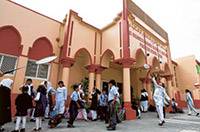Message from the President
Founded in April 2010, AALIMS reached a milestone at its third anniversary. As a sign of becoming an established organization, we have experienced our first “change of the guard.”
AALIMS – Princeton Conference on Islam and Human Capital
Program: View PDF
Presentations: View presenters and their papers
 All sessions are free and open to the public.
All sessions are free and open to the public.
2015 Annual Conference Organizing Committee
Tahir Andrabi (Pomona College)
Amaney Jamal (Princeton University), chair
Asim Khwaja (Harvard University)
Timur Kuran (Duke University)
Helen V. Milner (Princeton University)
Jacob Shapiro (Princeton University)


Presentations
Day 1: Friday, October 30
8:30-10:00am Student Workshop
Chair: Mohamad al-Ississ (American University in Cairo)
Diego Fossati (Cornell University), “Partisan Cooperation in Multi-level Political Systems: Evidence from Healthcare Reform in Indonesia”
Kevin Mazur (Princeton University), “Ordering Violence: Identity Boundaries and Alliance Formation in the Syrian Uprising”
10:00-10:15am BREAK
Conference Starts
10:15-12:30pm Vocational and Higher Human Capital (2:15)
Chair: Amaney Jamal (Princeton University)
Jennifer Peck (Swarthmore College), “The Impact of Hiring Quotas on Employment, Wages, and the Skill Premium: Evidence from Saudi Arabia” (Password protected)
Tahir Andrabi (Pomona College) and Niharika Singh (Harvard University), “Breaking the Glass Ceiling: Open Merit Admissions in Medical Education in Pakistan”
Asim Khwaja (Harvard University) and Jacob Shapiro (Princeton University), “Crossing Boundaries: Experimental Evidence on Skills Acquisition Access Constraints for Rural Women in Pakistan”
12:30-2:00pm LUNCH BREAK
2:00-3:30pm Educational Opportunities (1:30)
Chair: Thomas Pepinsky (Cornell University)
Melina Platas Izama (Stanford University) “The Puzzle of Muslim Disadvantage in Education: Majority Status and Schooling Outcomes” (Password protected)
Djavad Salehi-Isfahani (Virginia Tech University), “Equality of opportunity in educational achievement in the Middle East and North Africa” (published), and “Inequality of Opportunity in Educational Attainment in Middle East and North Africa: Evidence from Household Surveys” (unpublished)
3:30-3:45pm BREAK
3:45-5:15pm Education and Attitudes (1:30)
Chair: Helen Milner (Princeton University)
Adeline Delavande (University of Essex) and Basit Zafar (Federal Reserve Bank of New York), “Stereotypes and Madrassas: Experimental Evidence from Pakistan” and “Gender Discrimination and Social Identity: Evidence from Urban Pakistan”
Najeeb Shafiq (University of Pittsburgh, Education School), “Returns and Revolution: Schooling, Earnings, and Protest Participation during the Arab Spring and Arab Winter”
5:15-5:30pm BREAK
5:30-7:00pm PANEL 1: Curriculum, Ideology, and Civic Attitudes (1:30)
Moderator: Quy-Toan Do (World Bank)
Tahir Andrabi (Pomona College)
Thierry Verdier (Paris Scool of Economics)
Dana Burde (New York University)
7:00-9:00pm Conference dinner
Day 2: Saturday, October 31
8:30-10:45am Educational Attainment (2:15)
Chair: Timur Kuran (Duke University)
Yasin Kürşat Önder (Central Bank of Turkey) & Mrittika Shamsuddin (United Arab Emirates University), “Do Islamic Mayors Really Empower Women?”
Erica Field (Duke University), “Financial Incentives and Girls’ Empowerment and Schooling in Bangladesh” (Password protected)
Mahdi Majbouri (Babson College), “Exemption and Education: Exploiting a Discontinuity in Compulsory Military Service Law”
10:45-11:00am BREAK
11:00-12:30am PANEL 2: Gender and Education (1:30)
Chair: Tarek Masoud (Harvard University)
Erica Field (Duke University)
Asim Khwaja (Harvard University)
Erik Meyersson (Stockholm School of Economics)
Tara Vishwanath (World Bank)
12:30-1:00pm PACKED LUNCH
1:00-2:30pm Gender (1:30)
Chair: Jacob Shapiro (Princeton University)
Lisa Blaydes (Stanford University), Jeremy Weinstein (Stanford University), and Yael Zeira (University of Mississippi), “Exploring the Determinants of Child Marriage in the Muslim World” (Password protected)
Amaney Jamal (Princeton University) and Helen Milner (Princeton University), “Women, Patriarchy and Globalization in MENA: Evidence from Tunisia” (Appendix)


